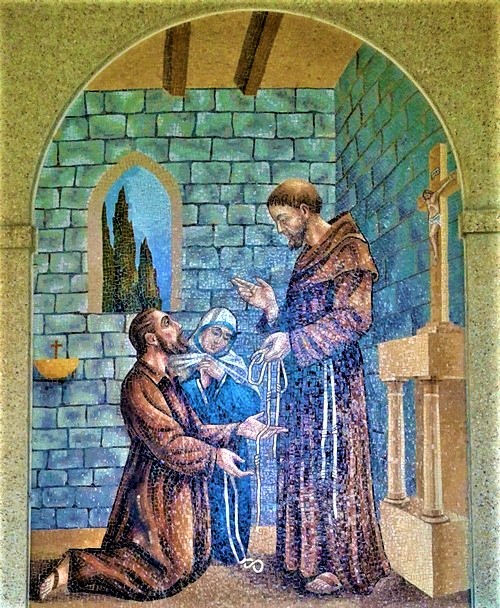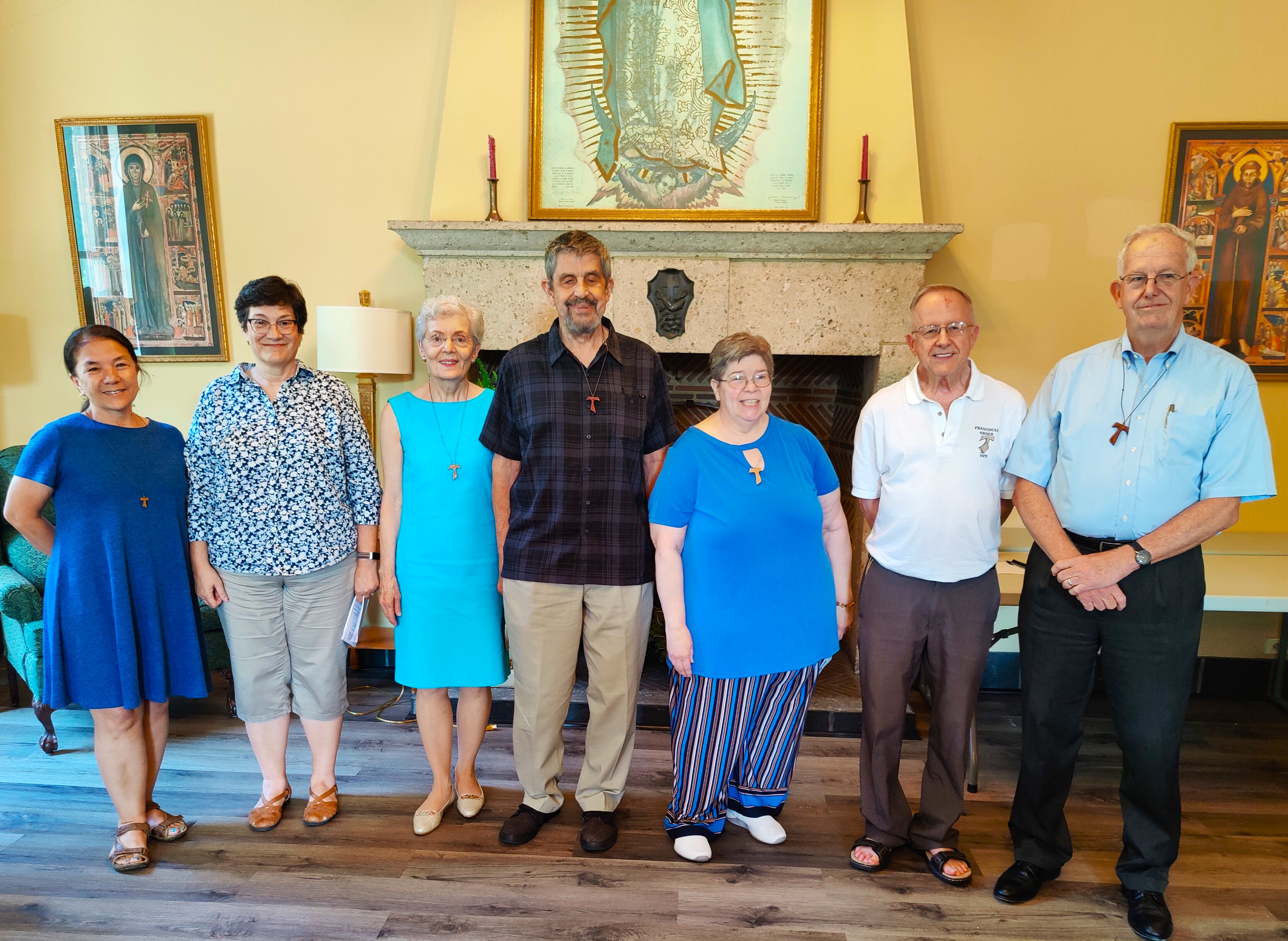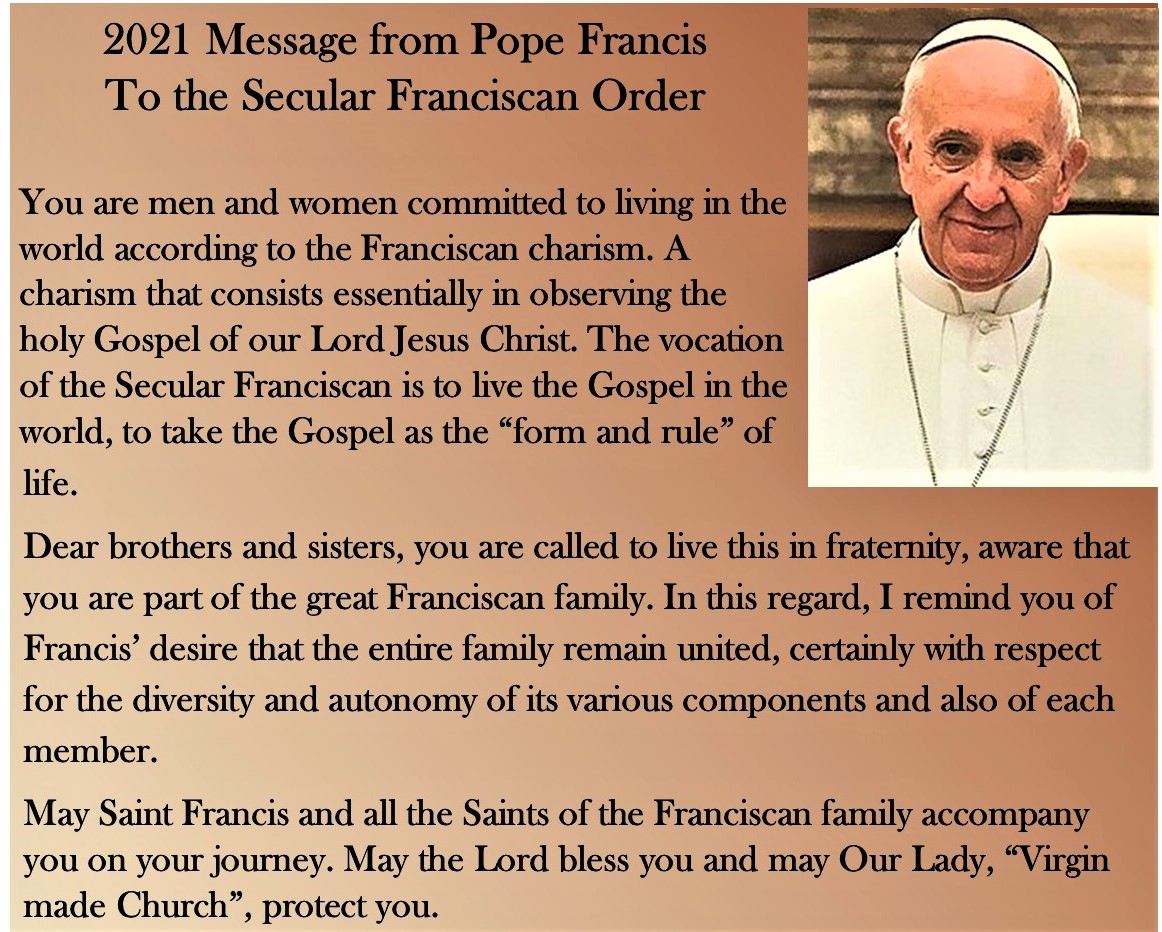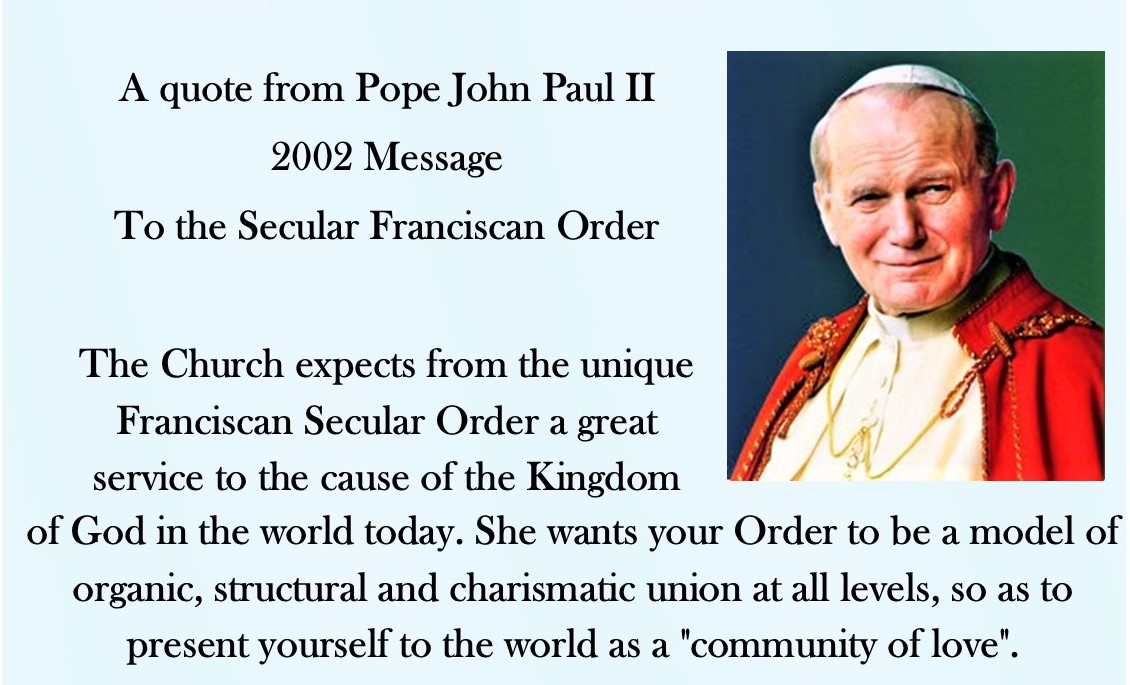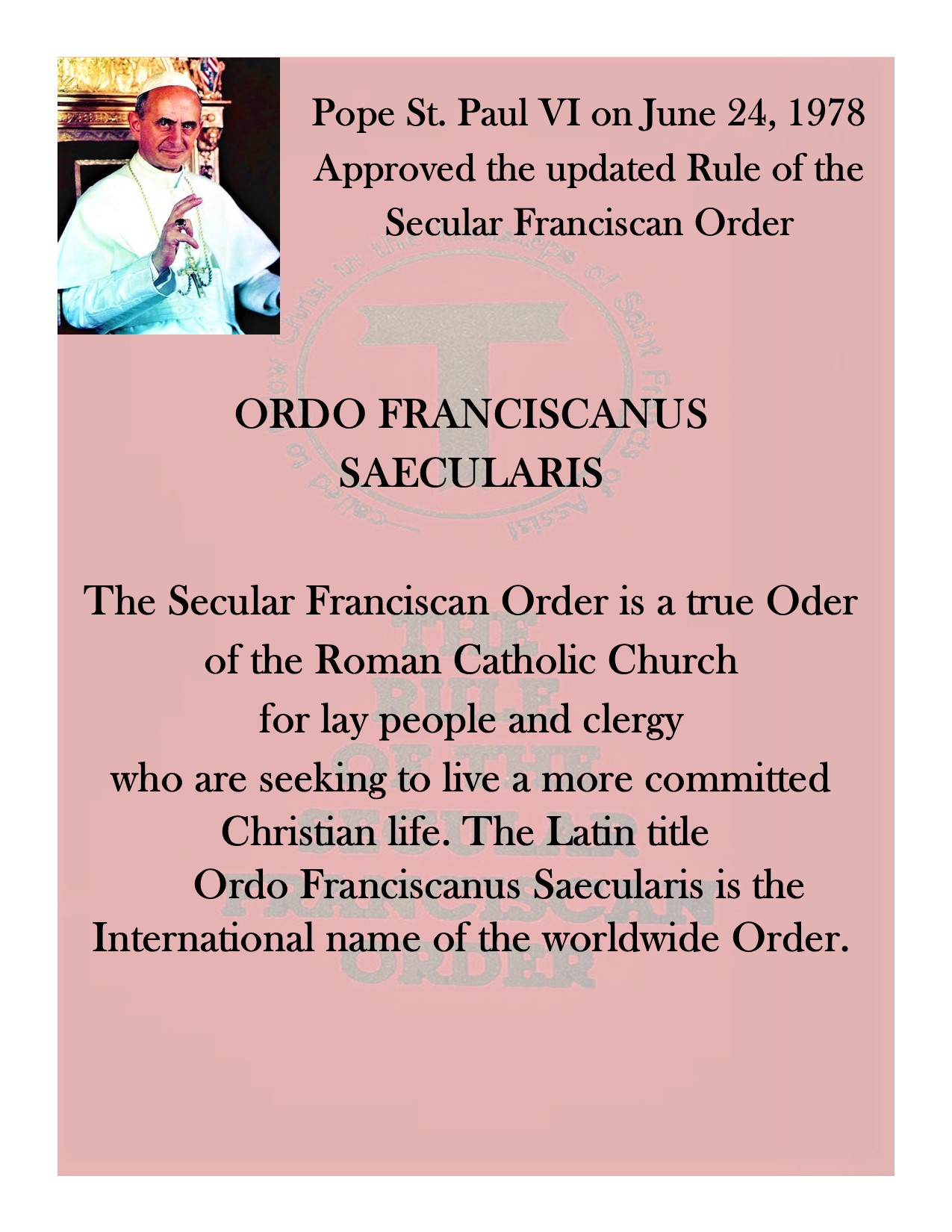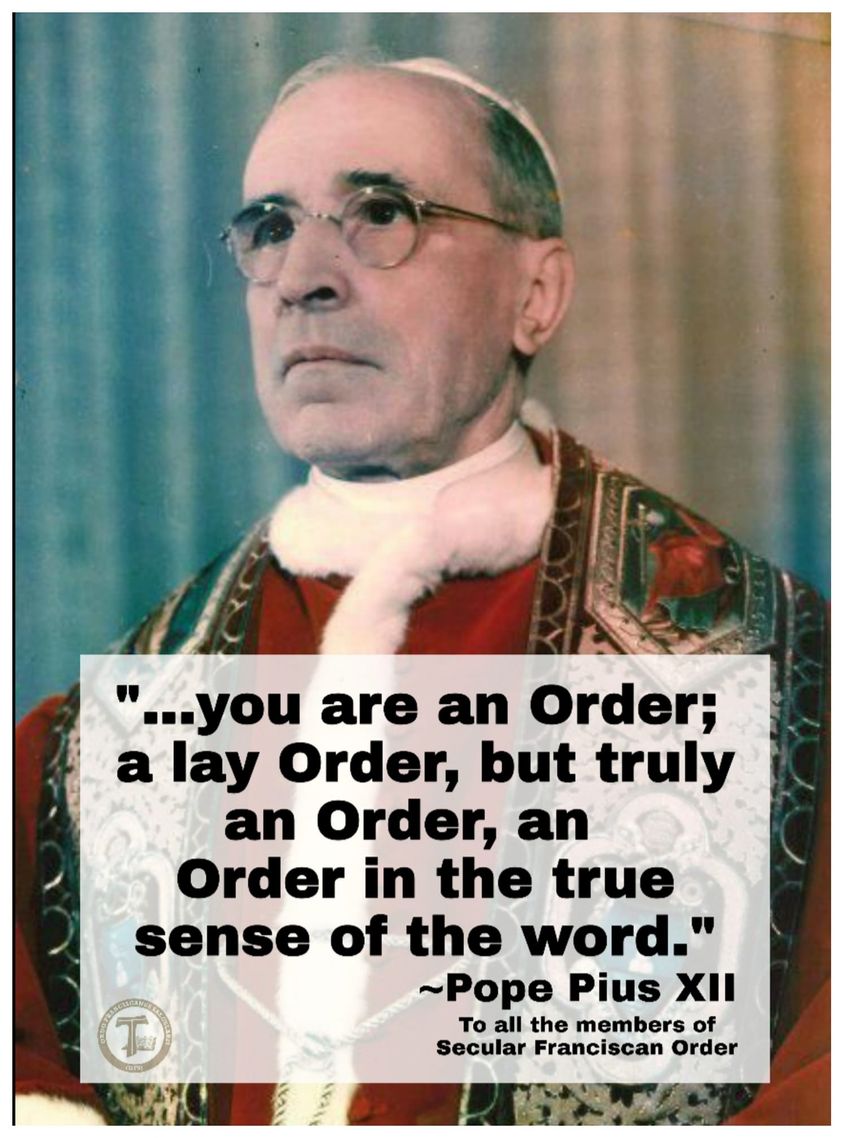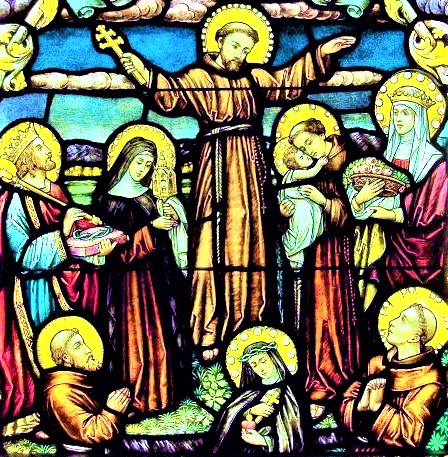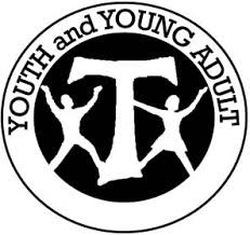
YOUFRA is an inverted acronym for FRANCISCAN YOUTH. It refers to a group of young people who feel called to follow Christ in the example of St. Francis of Assisi. They are “Franciscans” to the extent that they are attracted to St. Francis and have chosen him as a model, guide, and patron. Its meaning is not the same as YOUNG FRANCISCAN which implies profession in the Franciscan Order. Our region is currently looking to grow YouFra and have more groups that are supported by our fraternities.
MAIN OBJECTIVE OF THE YOUFRA
Although the Franciscan Youth fulfills several objectives related to the needs of the youth, one main objective serves as a guide in carrying out its varied activities: to help young people discover, develop, and deepen their vocation in life in the light of the Gospel of our Lord Jesus Christ and the message of St. Francis of Assisi.
YouFra is an international organization and sponsored by the International Secular Franciscans.
If you would like to know more about YouFra in our region, please contact our Youth and Young Adult Coordinator, Daniel Castilo, OFS at daniel28es@gmail.com
**************************************************
“But any kind of social or cultural discrimination in basic personal rights on the grounds of sex, race, color, social conditions, language, or religion, must be curbed and eradicated as incompatible with God’s design.” (Gaudium Et Spes: The Church in the Modern World, Vatican II, 1965, #29)
Statement from the United States Secular Franciscan Youth and Young Adult Commission Regarding Racism and Our Responsibility to Young People
Saint Francis of Assisi devoted his life to rebuilding the Church, healing wounds, and bringing peace as well as dignity to all. Secular Franciscans are called to follow in his footsteps. Living Christ-centered lives is essential especially in light of racism that permeates our society. We are called to seek the divine seed in all God’s children and strive for unity. Racism only brings hatred where there should be love and is counter to our Franciscan charism.
The Franciscan Youth and Young Adult (FY/YA) Commission challenges our brothers and sisters to animate young people in this important work. In order to do that, we must prepare ourselves first. Recent events have forced all of us to identify systemic racism in society. It is not enough to simply say this is a problem for someone else. The Rule of the Secular Franciscan Order, which we profess to live, demands that we “be in the forefront in promoting justice by the testimony of [our] human lives and [our] courageous initiatives.” (art. 15) We see many young people already participating in social justice action and they need our presence, Christian example, and support. It is important that young people know their stance against racism is valid. Secular Franciscans are called to help them discern an appropriate response based on a gospel perspective. Through study, dialogue, and prayer we have a responsibility to grow in our own Franciscan charism and our knowledge of Catholic Social Teaching. Only then can we walk confidently with our young people as we confront difficult issues together.
We are specifically directed by our Rule to “foster communion with” youth and young adults, and to adopt “appropriate means for growth in Franciscan and ecclesial life.” (art. 24) In other words, we invite youth and young adults on the journey toward finding Christ within themselves and others. They are hungry for change. Secular Franciscans need to be ready to support young people as they discern their role in society, the Church, and the world.
Some Secular Franciscans may not currently be working with official youth fraternities (YouFra). However, genuine relationships found in our families, among our friends, and in our fraternities should not be discounted. When the Holy Spirit creates an opportunity for dialogue or action, we need not be afraid. If we are properly prepared, we are able to listen with openness in our hearts and speak truth with love and peace, “For the Holy Spirit will teach [us] at that moment what [we] should say.” (Luke 12:12)
This is a time to work together in assisting our youth and young adults in achieving their own goals against the evils of racism. The FY/YA Commission is committed to educating ourselves then stepping forward in solidarity with our young people, remaining faithful to our Franciscan spirituality. We ask that you consider the same challenge.
**************************************************
April 8th, 2017
Pope Francis to the Youth and Young Adults
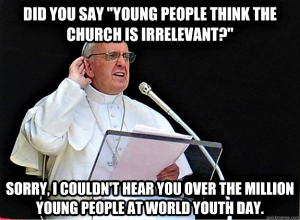
Dear Young Friends,
Thank you for coming! This evening marks a double beginning. It is the beginning of the journey towards the Synod, which has a very long name – “Young People, the Faith, and Vocational Discernment”, but we can just call it the Synod of Young People. That way it is easier to understand! It is also a second beginning, the beginning of our journey to Panama. The Archbishop of Panama is with us, and I greet him warmly.
We have listened to the Gospel, prayed, sung and brought flowers to the Madonna, our Mother. We also brought the World Youth Day cross, which has come from Kraków and will be handed over tomorrow to the young people from Panama. From Kraków to Panama, with the Synod in between. A Synod from which no young person should feel excluded!
Some people say: “Let’s hold the Synod for young Catholics, for those belonging to Catholic groups; that way it will be better”. No! The Synod is meant to be the Synod for and of all young people. Young people are its protagonists. “But even young people who consider themselves agnostics?” Yes! “Even young people whose faith is lukewarm?” Yes! “Even young people who no longer go to Church?” Yes! “Even young people who – I don’t know if there are any here, maybe one or two – consider themselves atheists?” Yes! This is the Synod of young people and we want to listen to one another. Every young person has something to say to others. He or she has something to say to adults, something to say to priests, sisters, bishops and even the Pope. All of us need to listen to you!
Let’s think back to Kraków; the cross is a reminder. There I said two things, perhaps some of you will remember. First, it is not good to see a young person already retired at twenty! Second, it is also not good to see a young person spending his or her life on a couch. Isn’t this the truth? We need young people who are neither retired nor couch potatoes! We need young people who are on the road and moving forward, at each other’s side but looking ahead to the future!
In the Gospel (cf. Lk 1:39-45) we heard how Mary receives that grace, that immense vocation of bringing God’s gift to us. The Gospel tells us that after hearing that her elderly cousin was expecting a child and needed help, Mary sets out in haste to help her. She hurries! The world today needs young people who “hurry”, who don’t get tired of hurrying. We need young people who feel a call, who feel that life offers them a mission. Young people who, as Maria Lisa (a young religious Sister) said so often in her testimony, are on the go. Maria Lisa shared her experience with us: it was an experience of being on the go. We need young people on the go. The world can change only if young people are on the go.
But this is the tragedy of the world today, and of young people today, that young people are often discarded. They don’t have work, they don’t have an ideal to pursue, they lack education and they lack integration. So many young people have to flee, to migrate to other lands. Young people today, it is painful to say, are often discarded. We cannot tolerate this! We have to hold this Synod to say: “We young people are here!” And we are going to Panama to say: “We young people are here, on the march, and we don’t want to be discarded! We have something of value to give!
While Pompeo was talking (in the second testimony), I was thinking that twice he was almost at the point of being discarded – when he was eight and again when he was eighteen. But he made it: he was able to pick himself up. Life, when we look up always surprises us. Maria Lisa said this too. They both said this.
We are on the march, towards the Synod, and towards Panama. And this march has its risks, but when young people don’t take risks, they are already old. We have to take risks.
Maria Lisa said that after receiving the sacrament of Confirmation she fell away from the Church. You all know that here in Italy the sacrament of Confirmation is called the “sacrament of farewell”! After Confirmation, people stop going to church. Why? Because so many young people don’t know what to do. But Maria Lisa never stopped, she kept walking: at times along dark ways, poorly-lit ways, without ideals or with ideals that she didn’t quite understand; but in the end, she too made it. As young people, you have to take a risk in life. You have to prepare for tomorrow today. The future is in your hands.
In the Synod, the entire Church wants to listen to young people: to what they are thinking, to what they want, to what they criticize and to what they are sorry for. Everything. The Church needs lots more springtime, and springtime is the season of the young.
I want to invite you to make this journey, this march towards the Synod and towards Panama, and to make it with joy, with your aspirations, without fear, without shame, and to make it courageously. Courage is needed. But also the effort to appreciate the beauty of little things, as Pompeo said: the beauty of everyday life. Be grateful for life, don’t ever lose this ability. Be thankful for what you are: “This is how I am, thank you!” So often in life, we waste time asking ourselves: “Who am I?” You can keep asking, “Who am I?” for the rest of your lives. But the real question is: “For whom am I?” Like Our Lady, who could ask: “For whom, for what person, am I”, here and now? She answers, “For my cousin”, and off she goes. “For whom am I?”, not “Who am I?”. The answer to that second question comes later; it is a question that has to be asked, but first, you have to ask why: why you do something, something for your entire life, something that makes you think, makes you feel makes you work. There are these three languages: the language of the mind, the language of the heart, and the language of the hands. Never stop moving ahead.
There is something else I want to tell you. The Synod will not be a “chat room”. World Youth Day will not be a chat room, or a form of entertainment, or a nice happy experience from which you can then move on. No! Concreteness! Life demands concreteness of us. In this liquid culture, we need concreteness, and concreteness is your vocation.
Now I would like to conclude… I had a written speech, but after seeing you, after listening to the testimonies, I thought I should say all the things I just told you. There are going to be times when you don’t understand, dark times, painful times, but also wonderful times, times of darkness and times of light… But I want to make one thing clear. We live in the present. At my age, people are getting ready to leave the scene… right? Who can be sure about life? Nobody. At your age, you have the future ahead of you. Life holds out a mission to young people today; the Church holds out a mission, and I would like to entrust you with this mission. It is to go back and talk to your grandparents. Today more than ever we need this bridge, this dialogue, between grandparents and grandchildren, between the young and the elderly. The prophet Joel makes this prophecy:
“Your old men shall dream dreams, and your young men shall see visions” (2.28). In other words, the young will make things happen because of their vision. So this is the task I am giving you in the name of the Church. Talk to older people. You may say: “But it’s boring… They are always talking about the same things…” No! Listen to older people, talk to them, ask them questions.
Make them dream, and from those dreams take what you need to move forward so that you can have a vision and make that vision concrete. This is your mission today. This is the mission the Church gives you today. Dear young friends, be courageous! You may say: “But Father, I have sinned, I fall so often!” I think of an Alpine song, a lovely song that mountaineers sing: “In the art of scaling a mountain, the important thing is not that you fall; it is that you get up and keep going!” Have you fallen? Get up and keep moving. But think about the dreams your grandfather or grandmother had, make them talk about them, take those things and build the bridge to the future. This is the task and the mission the Church is giving you today.
Thank you so much for your courage and now… off to Panama! I don’t know whether I will be there, but the Pope will be there! And the Pope in Panama will ask you this question: “Did you talk to older people? Did you take the dreams of the elderly and make them visions? Are you making them happen? This is your task. May the Lord bless you, pray for me, and together let us prepare for the Synod and for Panama. Thank you.
Pope’s Message for World Youth Day: “Have the courage to be happy”
Vatican City, 17 February 2015 (VIS) – “Blessed are the pure in heart, for they shall see God” is the title of the Holy Father’s message for the thirtieth World Youth Day, celebrated every year on Palm Sunday. The Pope continues his reflection on the Beatitudes, and after referring to his previous messages on “revolutionary meaning” and the “powerful summons of Jesus to embark courageously upon the exciting quest for happiness”, he goes on to focus on “the desire for happiness”, starting from the first chapters of the Book of Genesis which “shows to us the splendid beatitude to which we are called” and “consists in perfect communion with God, with others, with nature, and with ourselves”.
Francis divides his message into four parts. After speaking about the desire for happiness, he analyses the sixth beatitude paragraph by paragraph, explaining purity of heart. If the heart is considered in the Bible to be the “center of the emotions, thoughts, and intentions of the human person”, its purity consists fundamentally in the absence of contaminants such as hate, cowardice, and envy. He then turns to the care for creation, so that it does not become contaminated, and invites a “human ecology” that “ will help us to breathe the pure air that comes from beauty, from true love, and from holiness”. Francis also urged the young not to allow their ability to love or be loved. be instrumentalized or impaired, and not to trivialize love.
In the third part, “… for they shall see God”, he recalls that Jesus “awaits us always with open arms”, and calls to all “in whatever place or situation you find yourself”. “Encountering God in prayer, the reading of the Bible and in fraternal life will help you better to know the Lord and yourselves”, writes the Pope. “Like the disciples on the way to Emmaus, the Lord’s voice will make your hearts burn within you. He will open your eyes to recognize his presence and to discover the loving plan he has for your life”.
“Have the courage to be happy”, Francis concludes, recalling that this year’s World Youth Day begins the final stage in preparation for the next great global event to be held in Krakow, Poland in 2016, thirty years after St. John Paul II instituted the World Youth Days in the Church. This “pilgrimage of young people from every continent under the guidance of the Successor of Peter has truly been a providential and prophetic initiative”.
**************************************************
